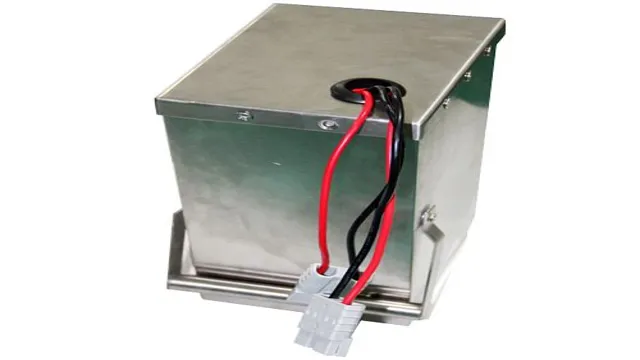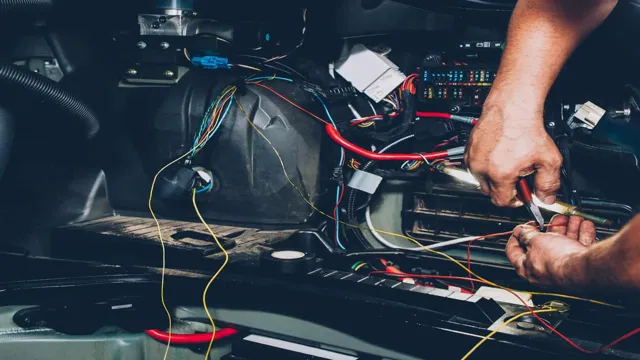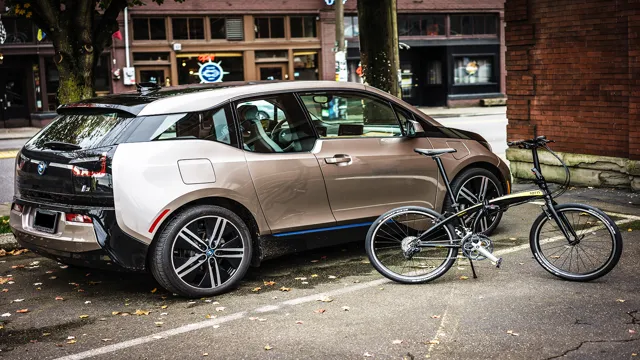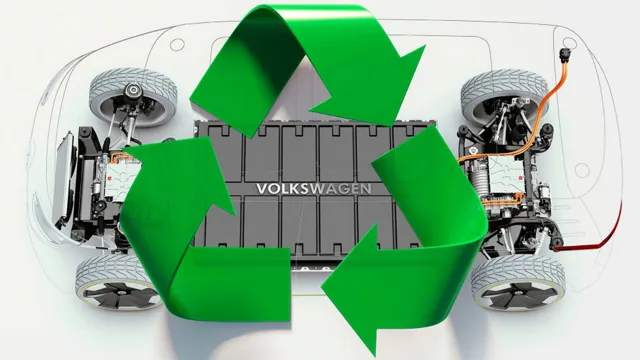Revolutionizing the Road: Electric Car Battery Improvements Set to Thrive by 2050
As climate change becomes more pressing, many countries are seeking ways to reduce their greenhouse gas emissions. One promising solution is electric cars, which emit far less carbon than traditional gas-powered vehicles. However, while electric cars have come a long way in recent years, their batteries still have significant limitations.
That’s where battery improvement technology comes in. By 2050, researchers predict that electric car batteries will be significantly lighter, more powerful, and cheaper to produce. This will allow electric cars to travel much farther on a single charge and make them more accessible to a wider range of consumers.
One exciting development in battery technology is the use of solid-state batteries. These batteries replace the liquid electrolyte found in conventional lithium-ion batteries with a solid material. This results in a battery that’s much safer, more efficient, and can store more energy in the same space.
Tesla has been at the forefront of developing solid-state batteries, and experts predict that these batteries could be the future of electric car technology. Other battery improvements that we can expect to see by 2050 include faster charging times, longer battery lifespans, and the ability to charge wirelessly. These improvements will make electric cars not just a sustainable choice, but a practical one too.
Imagine being able to charge your car as quickly and easily as you currently fill up with gas – it’s not too far off. Of course, there are still many challenges to overcome in developing better electric car batteries. But with the world’s top scientists and researchers working on the problem, there’s good reason to be optimistic about the future of sustainable transportation.
By 2050, we may be looking back on gas-powered cars as an outdated relic of the past.
The current state of electric car batteries
It’s exciting to think about the potential for electric car battery improvement by 2050. Battery technology has come a long way in recent years, with increases in both energy density and charging speed. However, there are still many challenges to overcome.
One major hurdle is the high cost of producing batteries, which limits the affordability of electric cars. Another challenge is the limited range of current batteries, which can be a barrier for drivers who need to travel long distances. Despite these obstacles, researchers and engineers are actively working to develop new battery materials and designs that could revolutionize the industry.
Some promising technologies include solid-state batteries, which use a solid electrolyte instead of a liquid one, and lithium-sulfur batteries, which have the potential to store more energy than traditional lithium-ion batteries. With continued investment and innovation, it’s possible that electric car batteries could become even more powerful and efficient by 2050, making electric cars an even more attractive option for drivers.
Exploring the limitations and challenges
The current state of electric car batteries is a hot topic in the automotive industry. While advancements have been made in battery technology, there are still limitations and challenges to overcome. One limitation is the range of electric cars, which is still significantly less than that of traditional gasoline-powered cars.
Although electric car batteries have improved, they still struggle with long distances and the charging time required for a full battery. Another challenge is the high cost of electric car batteries, which can make electric vehicles more expensive than their gasoline-powered counterparts. Despite these challenges, the demand for electric vehicles continues to grow, and experts predict that with further advancements in technology, these limitations will be overcome.
As battery technology evolves, the range and charging time of electric cars will improve, making them a more viable option for drivers. However, until these challenges are resolved, the switch to electric vehicles may be slower than some had hoped.
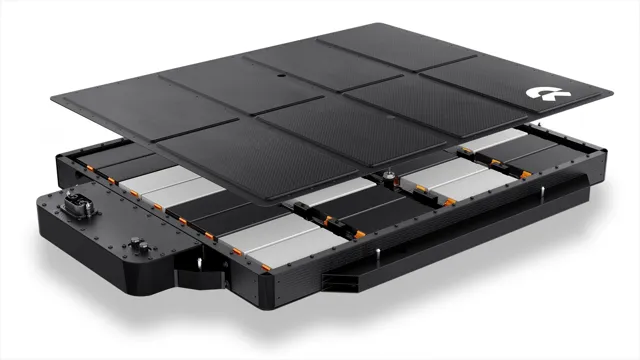
The impact of battery technology on electric cars’ features and performance
The current state of electric car batteries is one of constant innovation and improvement. The impact of battery technology on electric cars’ features and performance cannot be overstated. Battery technology determines the range of the vehicle, how quickly it can be recharged, and how long it can last.
Currently, lithium-ion batteries are the most commonly used type of battery in electric cars, and they have greatly improved the overall performance of electric vehicles. However, there are still limitations to these batteries. They are expensive to produce, have a limited lifespan, and can take hours to recharge.
Manufacturers are investing heavily in the research and development of more advanced battery technology, such as solid-state and lithium-sulfur batteries. These new technologies have the potential to greatly improve the performance and range of electric cars, making them more accessible to the average consumer. As we continue to see advancements in battery technology, we can expect even more impressive features and performance from electric cars.
Future battery technology developments
Researchers around the world are working towards electric car battery improvement by 2050. The current lithium-ion batteries that power electric vehicles are expensive, bulky, and susceptible to catching fire. However, new battery technologies are being developed that could address these issues.
For instance, solid-state batteries are being developed that use a solid electrolyte instead of the liquid electrolyte found in lithium-ion batteries. Solid-state batteries could offer higher energy density, longer range, and improved safety. Additionally, researchers are investigating the potential of using advanced materials such as silicon and sulphur to boost the power and lifespan of batteries.
These advancements could make electric vehicles more practical and affordable for everyday use, reducing our reliance on fossil fuels and helping to combat climate change.
Innovative battery materials and designs in the pipeline
Future battery technology developments The world’s increasing demand for energy can only be satisfied by cutting-edge technological advancements in the batteries that power our lives. Fortunately, a battery revolution is coming soon, with innovative materials and designs in the pipeline that could change how we think about energy storage. Researchers are currently exploring new battery materials like solid-state electrolytes, lithium-sulfur, and metal-air, which could significantly increase the energy density and life of batteries used in electric vehicles and other energy-intensive applications.
Some companies are even exploring new battery designs that use flow cells, which could provide a flexible and scalable solution for storing energy. With these exciting developments, it’s only a matter of time before batteries become cheaper, more efficient, and more widely available, helping us to meet our energy needs sustainably. So, are you excited about the future of batteries?
The potential impact on range and speed
Future battery technology developments hold immense potential in enhancing the range and speed of electric vehicles. Currently, most EVs are powered by lithium-ion batteries, which offer a range of around 300 miles on a single charge. However, with ongoing research and development, we may soon see the emergence of new battery technologies that provide longer ranges and faster charging times.
One of the most promising developments is solid-state batteries, which use solid electrodes and electrolytes to offer higher energy densities and faster charging. Another potential technology is lithium-sulfur batteries, which can potentially offer even higher energy densities than current lithium-ion batteries. These advancements may not only enhance the performance and usability of EVs but could also make them more affordable and accessible to a larger segment of the population.
As scientists and engineers continue to push the boundaries of battery technology, the possibilities for future breakthroughs are endless.
The looming competition between global automakers and battery manufacturers
The rise of electric vehicles has led to intense competition between global automakers and battery manufacturers. As the demand for these vehicles increases, manufacturers are racing against each other to develop new and improved battery technology to improve driving range, charging times, and battery lifespan. The future of battery technology is promising, with many new advancements on the horizon.
Some emerging technologies include solid-state batteries, which have higher energy density and longer lifespan than current lithium-ion batteries, and flow batteries, which have the potential for longer-lasting, greener energy storage. These developments will undoubtedly change the face of the automotive industry as we know it. But amidst this competition and innovation, the key players in the industry must also focus on sustainability and ethical sourcing of materials.
The future of electric vehicles and battery technology is exciting but also complex, requiring a holistic approach to ensure that growth and innovation do not come at the expense of the environment and society.
The role of regulations and policies in advancing battery technology
In order to achieve electric car battery improvement by 2050, it’s essential that we also consider the role of regulations and policies. Governments can play a significant role in incentivizing the development of new battery technologies and ensuring that they are safe and sustainable. For example, California has set a target for all new passenger cars sold in the state to be zero-emission by 203
This type of regulation provides a clear signal to automakers that they need to invest in clean technology if they want to compete in the marketplace. At the same time, policies that promote research and development can help accelerate the pace of discovery and innovation in battery technology. One such example is the Department of Energy’s Battery Innovation Act, which aims to establish a national center for advanced battery research.
By working together to establish these types of policies and regulations, we can create a sustainable and prosperous future powered by electric vehicles with improved battery technology.
The push for sustainable and clean energy
As the world continues to prioritize clean energy, battery technology has become increasingly important in the shift towards sustainability. But for batteries to truly play a significant role in this transition, regulations and policies need to support and encourage the advancement of this technology. Stronger regulations can incentivize companies to prioritize developing batteries that are more efficient, higher performing, and longer lasting.
Policies that provide funding for research and development can also help accelerate progress in battery technology. These types of regulations and policies help create a more conducive environment for innovation and investment, ultimately driving the growth of a cleaner and more sustainable energy system. As we push towards a greener future, we must recognize the importance of government support and action in shaping the development of battery technology.
Investments and funding opportunities in the battery industry
When it comes to advancing battery technology, regulations and policies play a significant role. Governments and regulatory bodies have the power to incentivize investment in research and development, provide funding opportunities, and set standards for safety and sustainability in battery production. These regulations and policies are important because they can encourage innovation and make it easier for businesses and investors to enter the market.
For example, the US government recently announced a $5 billion investment in electric vehicle charging infrastructure. This investment will not only make it easier for people to own and drive electric vehicles but also increase demand for batteries and drive innovation in battery technology.
As such, regulations and policies can have a profound impact on the growth and development of the battery industry.
Conclusion: What to expect from electric car batteries by 2050
In conclusion, the future of electric car battery technology is promising. By 2050, we could see batteries that offer longer range, faster charging times, and increased energy density. This will not only make electric cars more practical and affordable for everyday use, but also help to reduce our dependence on fossil fuels and combat climate change.
With continued research and innovation, the possibilities are electrifying!”
FAQs
What are the current limitations of electric car batteries?
The current limitations of electric car batteries include their limited range and charging time.
How is the research advancing the improvement of electric car batteries?
Research is focusing on developing new materials and technologies like solid-state batteries and hydrogen fuel cells to improve the performance and efficiency of electric car batteries.
What are the predictions for the future of electric car batteries by 2050?
Experts predict that by 2050, electric car batteries will have significantly higher energy density, longer range, and faster charging times.
What are the challenges to implementing electric car batteries as a replacement for traditional gasoline engines?
The main challenges to implementing electric car batteries as a replacement for traditional gasoline engines include high costs, limited availability of charging infrastructure, and consumer perceptions about electric car performance and range.

